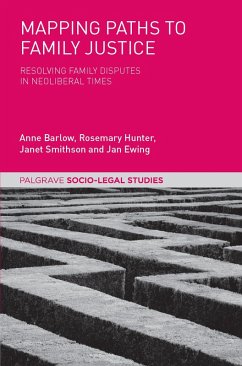The family justice system in England and Wales has undergone radical change over the past 20 years. A significant part of this shifting landscape has been an increasing emphasis on settling private family disputes out of court, which has been embraced by policy-makers, judges and practitioners alike and is promoted as an unqualified good.
Mapping Paths to Family Justice: Resolving Family Disputes in Neoliberal Times examines the experiences of people taking part in out-of-court family dispute resolution in England and Wales. It addresses questions such as how participants' experiences match up to the ideal; how recent changes to the legal system have affected people's ability to access out-of-court dispute resolution; and what kind of outcomes are achieved in family dispute resolution.
This book is the first study systematically to compare different forms of family dispute resolution. It explores people's experiences of solicitor negotiations, mediation and collaborative law empirically by analyzing findings from a nationally representative survey, individual in-depth interviews with parties and practitioners, and recorded family dispute resolution processes. It considers these in the context of ongoing neoliberal reforms to the family justice system, drawing out conclusions and implications for policy and practice.
Mapping Paths to Family Justice: Resolving Family Disputes in Neoliberal Times examines the experiences of people taking part in out-of-court family dispute resolution in England and Wales. It addresses questions such as how participants' experiences match up to the ideal; how recent changes to the legal system have affected people's ability to access out-of-court dispute resolution; and what kind of outcomes are achieved in family dispute resolution.
This book is the first study systematically to compare different forms of family dispute resolution. It explores people's experiences of solicitor negotiations, mediation and collaborative law empirically by analyzing findings from a nationally representative survey, individual in-depth interviews with parties and practitioners, and recorded family dispute resolution processes. It considers these in the context of ongoing neoliberal reforms to the family justice system, drawing out conclusions and implications for policy and practice.
Dieser Download kann aus rechtlichen Gründen nur mit Rechnungsadresse in A, B, BG, CY, CZ, D, DK, EW, E, FIN, F, GR, HR, H, IRL, I, LT, L, LR, M, NL, PL, P, R, S, SLO, SK ausgeliefert werden.


